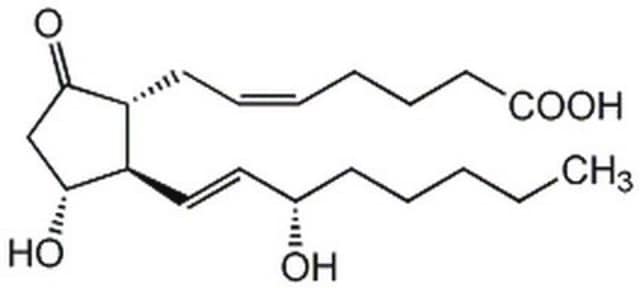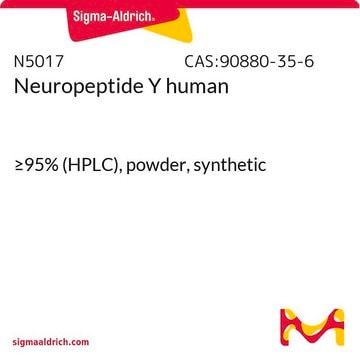P6532
Prostaglandin E2
γ-irradiated, powder, BioXtra, suitable for cell culture
Synonym(s):
(5Z,11α,13E,15S)-11,15-Dihydroxy-9-oxoprosta-5,13-dienoic acid, Dinoprostone, PGE2
About This Item
Recommended Products
biological source
synthetic (organic)
Quality Level
sterility
γ-irradiated
product line
BioXtra
form
powder
potency
0.25-100 ng/mL
technique(s)
cell culture | mammalian: suitable
solubility
ethanol: 1 mg/mL
shipped in
ambient
storage temp.
−20°C
SMILES string
O[C@@H]1CC([C@H](C/C=C\CCCC(O)=O)[C@H]1/C=C/[C@@H](O)CCCCC)=O
InChI
1S/C20H32O5/c1-2-3-6-9-15(21)12-13-17-16(18(22)14-19(17)23)10-7-4-5-8-11-20(24)25/h4,7,12-13,15-17,19,21,23H,2-3,5-6,8-11,14H2,1H3,(H,24,25)/b7-4-,13-12+/t15-,16+,17+,19+/m0/s1
InChI key
XEYBRNLFEZDVAW-ARSRFYASSA-N
Gene Information
human ... PTGER1(5731) , PTGER2(5732) , PTGER3(5733) , PTGER4(5734) , PTGIR(5739)
mouse ... Ptger1(19216) , Ptger2(19217) , Ptger3(19218) , Ptger4(19219)
Looking for similar products? Visit Product Comparison Guide
Application
Biochem/physiol Actions
Physical form
Signal Word
Danger
Hazard Statements
Precautionary Statements
Hazard Classifications
Acute Tox. 4 Oral - Repr. 1B
Storage Class Code
6.1C - Combustible acute toxic Cat.3 / toxic compounds or compounds which causing chronic effects
WGK
WGK 3
Personal Protective Equipment
Certificates of Analysis (COA)
Search for Certificates of Analysis (COA) by entering the products Lot/Batch Number. Lot and Batch Numbers can be found on a product’s label following the words ‘Lot’ or ‘Batch’.
Already Own This Product?
Find documentation for the products that you have recently purchased in the Document Library.
Customers Also Viewed
Our team of scientists has experience in all areas of research including Life Science, Material Science, Chemical Synthesis, Chromatography, Analytical and many others.
Contact Technical Service












